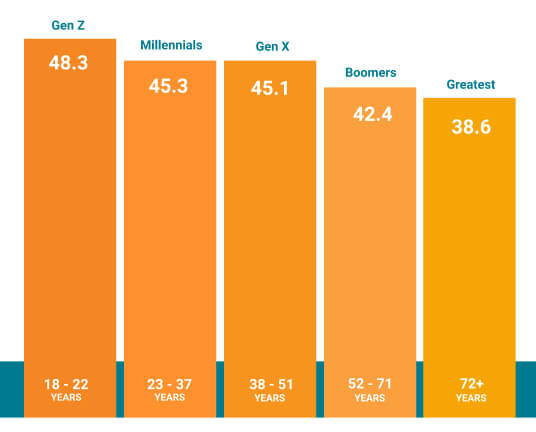Why Are Younger Workers Getting Lonelier and Sicker?
Adaptive coping measures are needed to improve mental and physical health.
At the beginning of this year, before the pandemic isolated people even more, Cigna announced that America’s loneliness epidemic had gotten worse. Cigna’s 2020 Loneliness Index revealed that 61% of American adults considered themselves lonely-up seven percentage points from 2018.
The study also described the business impact of loneliness, noting that “lonely workers say they are less engaged, less productive and report lower retention rates” and that “remote workers are more likely than non-remote workers to always or sometimes feel alone.” This latter finding will have even more serious implications now that so many of us are working from home.
Furthermore, the 2020 study confirmed what was initially a surprising finding from the 2018 study, that younger people (18-22) are lonelier than older people (72+). In fact, loneliness increases with each new generation:

Starting with people 72 and older, self-reported loneliness scores on the UCLA Loneliness Scale are progressively higher for each younger generation. This phenomenon was discovered by Cigna in 2018 and reconfirmed in 2020.
In similar fashion, members of younger generations reported poorer health status than older adults. 77% of people in the Greatest Generation said that their physical health was good, very good or excellent, versus only 65% of Gen Z-ers.The link between loneliness and physical health problems works both ways chronic illnesses like diabetes, high blood pressure, and obesity are major risk factors for loneliness, and loneliness is a major driver of worsening illness.
A 2016 study by the journal Heart, for example, which analyzed data from 23 studies involving more than 180,000 adults over extended timeframes, concluded that loneliness or social isolation was associated with a 29% higher risk of coronary artery disease and a 32% higher risk of stroke.Behavioral Science to the Rescue
Fortunately, behavioral science offers powerful tools and methods for effectively addressing and managing the thoughts, emotions, and physical issues associated with chronic illness and loneliness.In a 2014 study, reported on in Psychology Today, people who used psychologically adaptive, self-protective coping strategies—such as reframing negative circumstances positively and avoiding self-blame—did not become lonely over time.
Given the impact of loneliness on chronic conditions, our team at DarioHealth started looking at what we could do to address loneliness head on. We developed coaching training based on evidence-based strategies and implemented screening with the UCLA Loneliness Scale. We use information we get from our patients to assess their individual situations and determine how we can help.
Sometimes that help does come in the form of adaptive coping strategies like the ones mentioned earlier. Often, however, the simple act of interacting with our coaches can go a long way towards easing feelings of loneliness and isolation.
When it comes to loneliness, our coaches help users understand that meaningful connections with people are important for healing. In fact, former Surgeon General Vivek Murthy describes loneliness as the gap between the meaningful social connections a person has and the meaningful social connections that same person needs.
In our work with patients of chronic conditions, one of the most important insights we’ve gained is that loneliness lessens when people believe there are others out there—including friends, family members, and our coaches—who care about them and want them to live their lives to the fullest.
While this is true at any age, it’s even more important for younger persons who are facing physical and mental challenges in greater numbers. These people clearly demonstrate the need for a more holistic approach to health management.
At DarioHealth, we’re dedicated to applying state-of-the-art technology and personalized coaching to understand each member and help them focus on what really matters to them, not just what’s the matter with them. Barriers to better health, such as loneliness, will only resolve when people are supported in meaningful and impactful relationships with others.